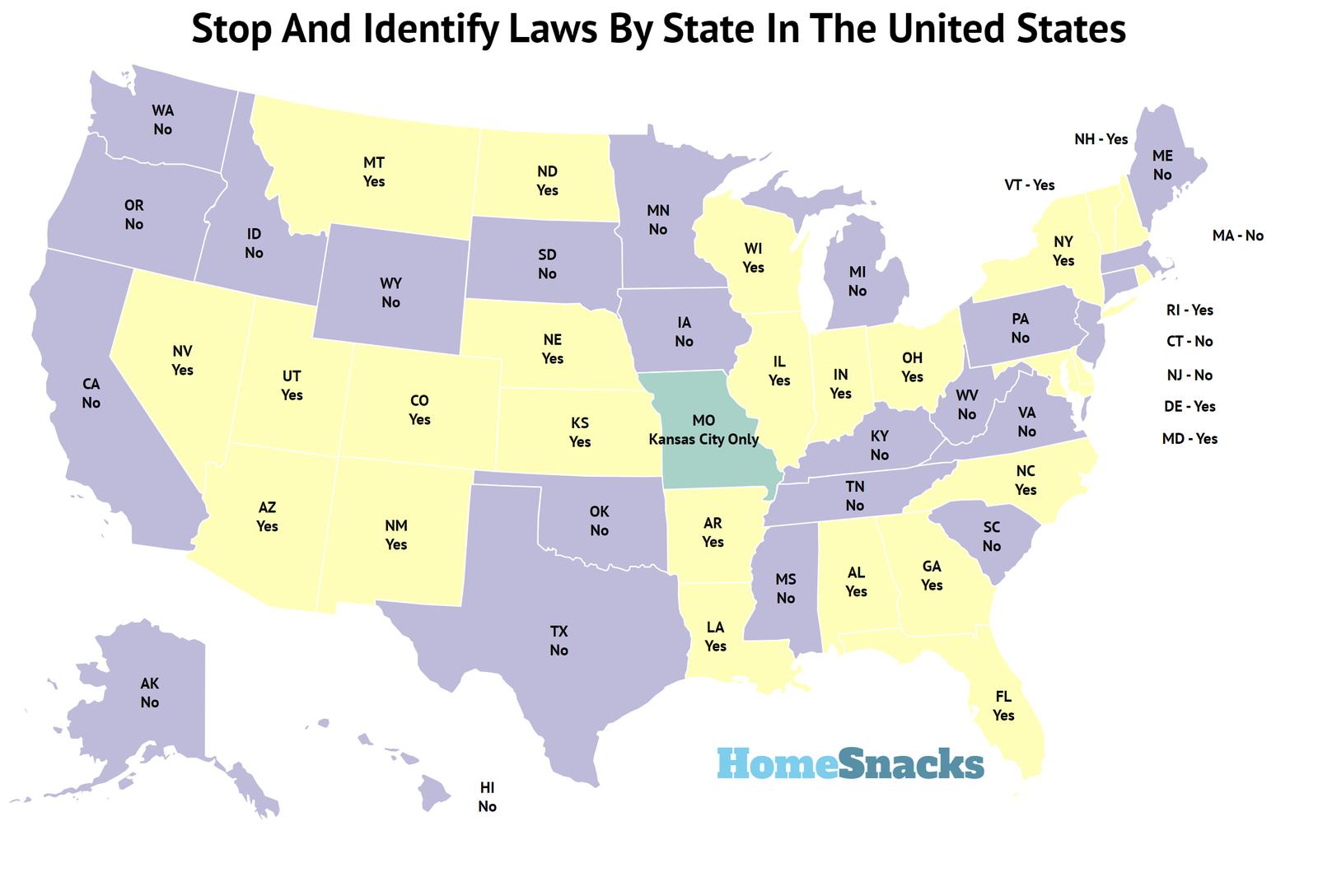Stop And ID laws by state research summary. “Stop and identify” statutes are regulations enacted in various U.S. states that grant law enforcement officers the legal authority to request individuals they have reasonable suspicion to believe may be involved in criminal activity to provide their name. Individuals are not obligated to disclose their identity without reasonable suspicion of illegal activity, even in these states.
We researched which states have laws that allow law enforcement to stop and ask for identification.
-
25 states have “Stop and identify” laws including Alabama, Arizona, and Arkansas
-
24 states do not have any statutes in place. These states include Wyoming, West Virginia, and Washington.
-
Missouri has no “Stop and ID” law, but Kansas City has a law in place.
Stop And Identify Laws By State Map
In the United States, no federal law mandates individuals to reveal their identity during a Terry stop. However, the Hiibel case clarified that states have the authority to establish such rules, with the condition that law enforcement officers must have a reasonable and articulable suspicion of criminal involvement.
The Hiibel decision implies that individuals detained by the police in states with constitutional “stop and identify” laws are legally required to provide identification. In contrast, those detained in states without such laws are not obliged to do so. Yet, the situation isn’t as straightforward as it seems, and here’s why:
-
The specific language of “stop and identify” laws can differ significantly from state to state.
-
Refusal to comply with a “stop and identify” law that doesn’t explicitly specify a penalty may still result in a violation of another law, such as resisting, obstructing, or delaying a peace officer.
-
State courts have offered varying interpretations of both “stop and identify” and “obstructing” laws, further complicating the matter.
The Fourth Amendment protects our privacy against unreasonable searches and seizures while emphasizing the importance of warrants backed by probable cause. A pivotal moment in shaping the landscape of lawful detainment occurred in 1968 with Terry v. Ohio, when the U.S. Supreme Court sanctioned the temporary detention of individuals based on “specific and articulable facts” that raise reasonable suspicion of a present or impending crime. This landmark decision further authorized officers to conduct protective patdowns if there was a reasonable belief that a person might be armed and pose a threat.
Some “stop and identify” statutes have faced scrutiny for their lack of clarity, potentially infringing upon the due process rights of suspects under the void for vagueness doctrine. Take Kolender v. Lawson in 1983, for instance, when the Supreme Court struck down a California law requiring “credible and reliable” identification as overly ambiguous. The Court also recognized that the Fifth Amendment might grant a suspect the right to withhold their na
States With Stop And ID Laws
- Alabama – Yes
- Arizona – Yes
- Arkansas – Yes
- Colorado – Yes
- Delaware – Yes
- Florida – Yes
- Georgia – Yes
- Illinois – Yes
- Indiana – Yes
- Kansas – Yes
States With No Stop And ID Laws
- Alaska – No
- California – No
- Connecticut – No
- Hawaii – No
- Idaho – No
- Iowa – No
- Kentucky – No
- Maine – No
- Massachusetts – No
- Michigan – No
Stop And Identify Laws By State
| State | Stop and ID Legal | Code |
|---|---|---|
| Alabama | Yes | Ala. Code §15-5-30 |
| Arizona | Yes | Ari. Rev. Stat. Tit. 13, §2412 (enacted 2005) & Tit. 28, §1595 |
| Arkansas | Yes | Ark. Code Ann. [1]§ 5-71-213 – Loitering |
| Colorado | Yes | Colo. Rev. Stat. §16-3-103(1) |
| Delaware | Yes | Del. Code Ann., Tit. 11, §§1902 (requires suspicion of a crime), 1321(6)(in the context of loitering) |
| Florida | Yes | Fla. Stat. §901.151 (Stop and Frisk Law); §856.021(2) (loitering and prowling) |
| Georgia | Yes | Ga. Code Ann. §16-11-36(b) (loitering) |
| Illinois | Yes | Ill. Comp. Stat., ch. 725, §5/107-14 |
| Indiana | Yes | Indiana Code IC §34-28-5-3.5 |
| Kansas | Yes | Kan. Stat. Ann. [2] |
| Louisiana | Yes | La. Code Crim. Proc. Ann., Art. 215.1(A); La. Rev. Stat. 14:108(B)(1)(c) |
| Maryland | Yes | Md. Criminal Code §4-206 |
| Missouri | Kansas City Only | Mo. Rev. Stat. §84.710(2) |
| Montana | Yes | Mont. Code Ann. §46-5-401 |
| Nebraska | Yes | Neb. Rev. Stat. §29-829 |
| Nevada | Yes | Nev. Rev. Stat. §171.123 |
| New Hampshire | Yes | N.H. Rev. Stat. Ann. §594:2, §644:6 |
| New Mexico | Yes | N.M. Stat. Ann. §30-22-3 |
| New York | Yes | N.Y. Crim. Proc. Law Laws of New York â CPL §140.50 (requires suspicion of crime) |
| North Carolina | Yes | State v Friend + N.C. Gen.Stat. § 14â223 (applies only to traffic stops) |
| North Dakota | Yes | N.D. Cent. Code §29-29-21 (PDF) |
| Ohio | Yes | Ohio Rev. Code §2921.29 (enacted 2006) |
| Rhode Island | Yes | R.I. Gen. Laws §12-7-1 |
| Utah | Yes | Utah Code Ann. §77-7-15 |
| Vermont | Yes | Vt. Stat. Ann., Tit. 24, §1983 |
| Wisconsin | Yes | Wis. Stat. §968.24 |
| Alaska | No | – |
| California | No | – |
| Connecticut | No | – |
| Hawaii | No | – |
| Idaho | No | – |
| Iowa | No | – |
| Kentucky | No | – |
| Maine | No | – |
| Massachusetts | No | – |
| Michigan | No | – |
| Minnesota | No | – |
| Mississippi | No | – |
| New Jersey | No | – |
| Oklahoma | No | – |
| Oregon | No | – |
| Pennsylvania | No | – |
| South Carolina | No | – |
| South Dakota | No | – |
| Tennessee | No | – |
| Texas | No | – |
| Virginia | No | – |
| Washington | No | – |
| West Virginia | No | – |
| Wyoming | No | – |
Methodology: How We Determined Stop And Identify Laws By State
To determine the legality of stop and identify in every state, we conducted the following analysis:
-
Compilation of Stop And Identify Laws. An initial step involved gathering information on stop and ID regulations from reliable legal sources, including official state government websites and legal databases. This compilation of stop and ID laws ensured accurate and up-to-date information.
-
Legal Review Of Stop And Identify Laws. Each state’s specific regulations were carefully reviewed to identify the stop and ID states.
-
Mapping Stop And Identify Laws By State. Finally, we mapped stop and ID legal status in each state.
Note we are not lawyers, and this is not legal advice.
Conclusion
In the United States, no federal law requires individuals to identify themselves during a Terry stop. However, the Hiibel case established that states can enact such laws if law enforcement officers have reasonable suspicion of criminal activity. Currently, 25 states have implemented these laws.
In states with “stop and identify” laws, individuals detained by the police are legally obligated to provide identification. In contrast, in states without such laws, they are not required to do so. However, the situation is complex due to variations in the wording of these laws from state to state. Noncompliance with these laws, even without explicit penalties, can lead to violations of other laws, like obstructing a peace officer. Additionally, state courts have differing interpretations of these laws, further complicating the matter.

